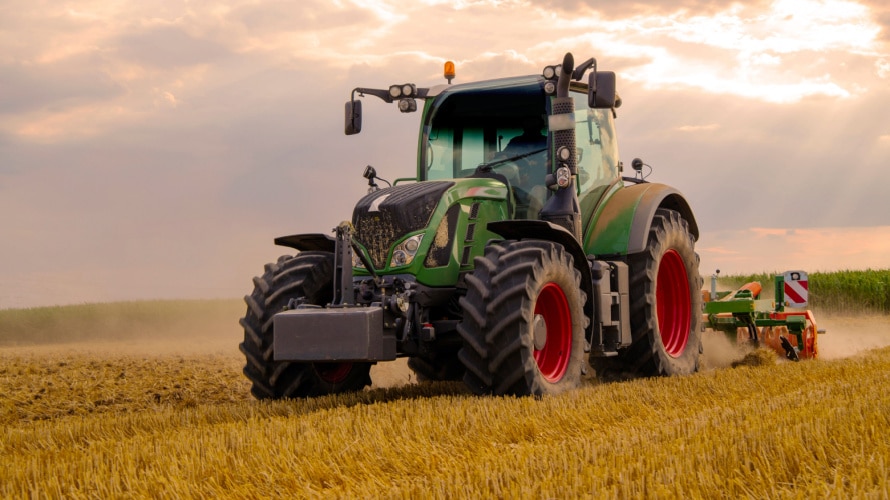From Fields to Roads: How Agricultural Tires Impact Farming Operations
February 13, 2024
Uncategorized

Agriculture is the backbone of Canada, and the hardworking farmers nationwide rely on a wide range of equipment to ensure their crops thrive. One critical component that often goes unnoticed but plays a significant role in farming operations is agricultural tires. In this blog, we’ll delve into the world of agricultural tires and how they impact farming operations, from tractor tires to implement tires.
Challenges in Choosing the Right Agricultural Tires
Farmers have unique challenges when it comes to selecting the right agricultural tires. These challenges revolve around the equipment they use and the varying terrains they operate on:
Diverse Terrain: Canadian farms are known for their diverse landscapes, from muddy fields to rocky terrains. Farmers need agricultural tires that can handle different surfaces, which may require a combination of tractor and implement tires.
Equipment Compatibility: Not all tires are suitable for every piece of farming equipment. Farmers must match the correct tires to their tractors, combines, and other machinery to ensure optimal performance.
Soil Compaction: Excessive soil compaction can harm crop yields. Farmers need tires that distribute weight evenly to reduce soil compaction, especially in wet conditions.
Durability: Agricultural equipment can put a lot of strain on tires. Farmers require durable tires that withstand heavy loads, sharp objects, and challenging weather conditions.
Cost Considerations: Balancing quality with budget constraints is always a concern. Farmers seek cost-effective options that still meet their performance requirements.
Reducing Fuel Consumption and Operating Costs
Properly selected and maintained agricultural tires can significantly impact a farm’s bottom line. Here’s how they help reduce fuel consumption and operating costs:
Efficient Traction: Tires designed for specific terrains provide better traction. This reduces slippage, allowing tractors and other equipment to operate more efficiently and consume less fuel.
Soil Preservation: Agricultural tires that distribute weight evenly help reduce soil compaction. This leads to healthier crops and reduces the need for costly soil remediation in the long run.
Longevity: High-quality tires, when properly maintained, last longer. Farmers save money by not having to replace tires as frequently.
Reduced Downtime: Well-maintained tires are less likely to experience flats or blowouts, reducing downtime for repairs and keeping operations running smoothly.
Improved Handling: Properly inflated and aligned tires improve handling, reducing wear and tear on equipment components and extending their lifespan.
Extending the Lifespan of Agricultural Tires
Farmers can adopt several maintenance practices to maximize the lifespan of their agricultural tires:
Proper Inflation: Regularly check and maintain the correct tire pressure. Underinflated tires increase wear and fuel consumption, while overinflated tires can lead to a rough ride and reduced traction.
Alignment: Ensure tires are properly aligned to prevent uneven wear. Misalignment can also cause handling issues.
Rotate Tires: Periodically rotate tires to ensure even wear across all four wheels. This extends their lifespan and maintains consistent performance.
Weight Distribution: Distribute weight evenly on implements and machinery to prevent excessive load on specific tires. This helps reduce wear and tear.
Inspect for Damage: Routinely inspect tires for cuts, punctures, or any signs of damage. Promptly repair or replace damaged tires to prevent further issues.
Cleanliness: Keep tires clean to prevent debris from causing damage or punctures. Clean them after working in muddy or rocky terrain.
Storage: Store tires in a cool, dry place away from direct sunlight. Protect them from exposure to harsh weather conditions when not in use.
Professional Maintenance: Periodically have your tires inspected and serviced by professionals who can assess wear and alignment, ensuring optimal performance.
In conclusion, agricultural tires play a vital role in the success of farming operations across Canada. Farmers face unique challenges when selecting the right tires. Still, with careful consideration, they can optimize fuel efficiency and reduce operating costs. Regular maintenance and proper tire care are essential to extending the lifespan of these critical components, ensuring that they continue to support the hardworking farmers who feed the nation.
Back

